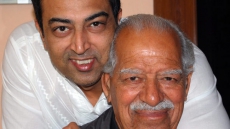The first 1,000 MW unit of the Kudankulam Nuclear Power Project (KNPP) built with Russian equipment was dedicated to the nation on Wednesday, with Prime Minister Narendra Modi saying this marked the start of Indo-Russian collaboration in the nuclear energy field and that bigger atomic power units would be built.
Speaking on the occasion, Modi said the successful completion of the first unit at Kudankulam is not just another fine example of the strength of the special and privileged strategic partnership between the two countries.
"It is also a celebration of our abiding friendship. In years ahead, we are determined to pursue an ambitious agenda of nuclear power generation. In our journey of cooperation, we plan to build a series of bigger nuclear power units," Modi added.
He said five more 1,000 MW units would be built at Kudankulam with Russian partnership.
Modi, Russian President Vladimir Putin and Tamil Nadu Chief Minister J.Jayalalithaa jointly dedicated to the nation the first 1,000 MW unit of the Kudankulam Nuclear Power Project (KNPP).
The dedication happened via video conferencing with Modi in New Delhi, Putin in Moscow and Jayalalithaa in Chennai.
The KNPP is located in Tirunelveli district in Tamil Nadu, around 650 km from here.
"The story of human development has been of wide spread technological advancement and growing economic prosperity. But, as we all know, it has not been without burden on our environment," Modi said.
Modi said he has a vision for India achieving economic development respectful of Mother Earth.
He said the Kudankulam nuclear power plant is part of India's plan to scale up its clean energy and also signals the commitment to build pathways of partnership for green growth.
Modi said the success of the project demonstrates the common resolve to grow the Indo-Russian relationship in new dimensions.
The Indian Prime Minister said the nuclear plant demonstrates the common resolve to keep the ties between India and Russia firm and steady.
"Above all, it showcases your personal commitment, consistent support and strong leadership in transforming the substance and character of our relationship. The people of India associate naturally and with great ease with the people of your great country," Modi told Putin.
The hardwork of Indian & Russian engineers, scientists & technicians has been commendable. I congratulate them. https://t.co/kipv7pjF9a
— Narendra Modi (@narendramodi) August 10, 2016
Wishing `Long Live Indo-Russian Friendship' Modi told Putin that he is looking forward to meet him at the ensuing G-20 meeting in China.
Modi also thanked Jayalalithaa for her participation in the event.
In his address, Putin said the cooperation in the field of nuclear power is important part of the privileged strategic partnership between India and Russia.
"Our work together in this sector has great importance for our countries' development," Putin said.
"This is not just about building a nuclear power plant and putting it into operation, but is a large-scale project to develop a new high-tech nuclear sector in India. This work involves the transfer of skills and training of personnel and specialists in this area," Putin added.
Putin said Russia is one of the world leaders in the field of nuclear technology and the atomic power plants built by his country are reliable.
According to him, the General Framework Agreement and loan protocol for third stage of the project would be signed by the end of this year.
In her address Jayalalithaa said: "The Kudankulam Nuclear Power Plant is a monument commemorating the long-standing, abiding and deep friendship between Russia and India."
According to her, the successful commissioning of the Kudankulam project is an object lesson on how the fears and apprehensions of the local population can and should be allayed, through a process of engagement and reassurance, and by building community assets and infrastructure.
Requesting early commissioning of the second 1,000 MW unit at KNPP, Jayalalithaa expressed confidence that the Nuclear Power Corporation of India Ltd (NPCIL) will maintain the highest safety standards and also ensure continuous power generation at the two units so that Tamil Nadu and the neighbouring states can rely on Kudankulam as a reliable base load power station.
The formal dedication of the first unit to the nation comes over one-and-half years after the unit started commercial production.
India's atomic power plant operator NPCIL has built two similar 1,000 MW nuclear power plants at Kudankulam with Russian equipments.
The first unit attained criticality, which is the beginning of the fission process, in July 2013.
Subsequently it was connected to the southern grid in October 2013. However, commercial power generation began only on December 31, 2014.
However the unit experienced regular breakdowns after that and finally got stabilised some months ago to generate at an average around 940 MW power daily.
Anti-nuclear activists say that the first unit at KNPP had broken down over 30 times.
It was the first pressurised water reactor of India.
Meanwhile the second unit went critical or started nuclear fission on July 10. The commercial power generation is expected to start four to six months after attaining criticality.
Once the second unit at Kudankulam starts power generation to its full capacity, the total atomic power capacity in Tamil Nadu would go up to 2,440 MW.
Already, the NPCIL has two 220 MW units at Kalkpakkam near here under its Madras Atomic Power Station.



